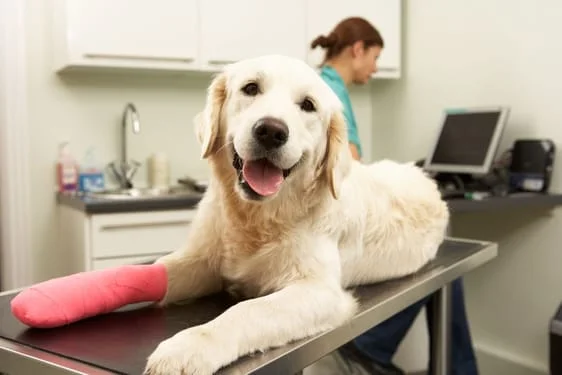Veterinary Surgery for Fractures at Sirius Veterinary Orthopedic Center
Fractures can be just as troubling for pets as they are for humans, especially when weight-bearing bones and joints are involved. A fracture that can't heal properly can leave your pet suffering from constant pain and lameness -- and some complex fractures raise the risk of serious infections and other complications. While many simple fractures can be set and rehabilitated through conservative veterinary care methods, some need extra help in the form of orthopedic veterinary surgery. Our experienced orthopedic veterinary team here at Sirius Veterinary Orthopedic Center can provide skilled surgical care and state-of-the-art techniques to help get your best friend back on the mend.

When Does Your Pet's Fracture Require Surgery?
Healthy bones are remarkably strong and resilient, but they can and do break. This problem can be especially prevalent in smaller breeds, or baby animals such as puppies and kittens, simply because their bones are thinner and more delicate. A fracture may occur in just about any bone in the body, although they show up most often in the long bones of the limbs (radius, ulna, tibia, femur), pelvis, joints (elbow and hip), or jawbone. Senior animals may also be more prone to injuries if stiffened joints or sensory impairments limit their ability to dodge dangers such as approaching cars.
Fractures can take many forms, some of which are trickier to treat than others. The two primary categories of fractures are incomplete (in which the bone doesn't break all the way through) and complete (in which the bone breaks into two or more pieces). Incomplete fractures can range from hairline cracks to "greenstick" injuries in which one side of the bone has broken and the other has only bent. Complete fractures may take forms such as:
- Simple - A simple fracture is a clean break, with the bone being broken all the way through and is usually only two pieces.
- Comminuted - In a comminuted fracture, there are several bone fragments that have typically moved out of alignment with each other.
- Compound - In a compound fracture, one part of the break has penetrated the skin. This is a particularly urgent situation due to the blood loss and risk of dangerous bacterial infection involved.
Fracture Repair from Our Team of Orthopedic Professionals
If your pet is crying, limping or clearly suffering from a leg or joint injury, don't try to diagnose and/or treat the problem yourself; instead, take your pet to you family veterinarian where they exam and properly diagnose your four legged athlete. They can also take X-rays to look at the condition of the bones or joints. If a fracture has been diagnosed, ask your veterinarian about a referral to the Sirius Veterinary Orthopedic Center where our cat and dog orthopedic surgeons will help create the proper treatment plan for your loved one.
Treatment of a fracture depends on its type and severity. An incomplete, uncomplicated foreleg fracture, for instance, may be treated by setting the bone alignment (if necessary) and applying a splint or cast to immobilize the bone while the fracture's edges knit themselves back together. More complicated or severe fractures, however, typically call for orthopedic veterinary surgery. In the case of a compound fracture, a cat or dog orthopedic surgeon must also sterilize the open wound, stop any bleeding and seal the wound's edges to prevent infection. Our team of doctors may recommend one of two main types of surgical repair:
- External fixation - External fixation involves the use of pins connected by metal rods. The pins are surgically implanted through the skin and into the bone, with the external rods holding the pins (and therefore the bone ends) rigidly in place throughout the healing process. Once the fracture is healed, this hardware is removed.
- Internal fixation - Internal fixation is the surgical attachment of rods, screws, plates and other metal hardware directly to the bone itself, fixing the bone ends in place rigidly and permanently. After healing is complete, the hardware will commonly remain inside your pet with no ill effects.
Need an Orthopedic Veterinarian?
Your family veterinarian will let you know when it is time to see one of our orthopedic specialist in Omaha. Call Sirius Veterinary Orthopedic Center today at 402-934-1332 to learn more about our fracture treatment services and our appointment process.
